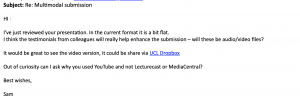I have been an educator in various modes since June 2004 when I obtained PGCE (Secondary) ICT. From June 2004 to late December 2012 I taught ICT across key stages 3, 4 and 5.
Since joining UCL in January 2013 I have had a number of roles, these have either been predominantly focused on training or have had training as a component of the role.
During my time at UCL I have obtained initally Associate Fellowship of the HEA, that has subsequently be superceded by my obtaining Fellowship of the HEA. In addition, to support the learning design work I was undertaking based on the Software Carpentry workshop methodology, I certified as a Carpentries Instructor. Since becoming a Carpentries Instructor I have delivered a number of workshop sessions, helped organise a workshop and acted as a teaching assistant in numerous workshops.
During the Spring and Summer of 2021 I have been assisting with the roll-out of a new online assessment programme. I have worked with colleagues taking part in the pilots. This has involved talking to colleagues about the nature of their assessments and how to best set-up the system for that assessment. I have also supported staff in the use of the new platform.
Mentoring of multi-modal submissions Advance HE (HEA) Arena Fellowships
Sam Ahern’s contribution to the fellowship and mentoring scheme:
A multimodal option for fellowship submissions is something we introduced at the last Advance HE (HEA) Arena Fellowship accreditation for Descriptors 1-3.
This was as a result of feedback and to increase inclusivity, and allows applicants for Arena fellowship to replace written case studies with multimodal submissions, usually including video and presentation software. In order to support this process better, Sam offered, after producing her own very successful and innovative multimodal submission, to assist colleagues in their endeavours. As a result, in 2020- 21 she became our official ‘multimodal mentor’ and has spent considerable time assisting potential applicants with how to best work with this type of format. Multimodal applications have increased greatly this year, and Sam’s assistance has been vital in facilitating that, with at least four mentoring relationships established by her this academic year.
Karen Matthewman, Arena Fellowship and Mentoring Lead
These email segments are an example of some of the mentoring exchanges I have had with colleagues about their applications. These exchanges are with the same colleague over a period of time, we had also met online via MS Teams to discuss their application submission.
Reflection
Supporting colleagues across the institution with their multimodal applications has enabled me to explore the different approaches to teaching and learning, and the challenges of different contexts. In addition it has enabled me to deepen my understanding of the professional standards framework and how the standards can be evidenced. This was particularly the case in Spring 2021 when I informally supported a colleague in ISD with their Associate Fellow Application. Answering their questions about what could be used for the case studies, how best to frame it and ensuring that reflection was included.
It has been dauting at times supporting more senior colleagues in the development of their applications. At times I have referred colleagues to further support from the Arena centre team as I felt that they needed more guidance on the process or support in developing or refining their case studies. Sometimes also recommending a later submission window. In most instances however, I have supported colleagues in how to make the most of the mutimodal format to enahnce their application for instance by recommending the inclusion of some multimedia evidence.
In most cases colleagues have responded positively to the feedback and have gone on to make successful applications for fellowship at various levels.
Technology, Pedagogy and Content Knowledge (TPCK) and Critical Digital Pedagogy
Back in early 2018 in the Digital Education blog post TPCK, data and learning design I wrote:
Technology is both what I have studied and what I have taught others. The use of technology in learning activities was authentic and integrated into the learning design. Technology, pedagogy and curricula are therefore intrinsically intertwinned.
For meaningful use of technology in teaching and learning these three elements should form a braid.
At the time I was making reference to the 2007 paper What is Technical Pedagogical Content Knowledge?
This paper is still an important frame of reference, and pedagogic intent is still key to the design of learning activities and any technologies deployed to support those. However, in recent years I would describe my approach as more that of a Critical Digital Pedagogue.
In addition to the pedagogic element of technology use, I also consider and ask colleagues to consider ethical and EDI considerations when selecting digital tools. If we are teaching about sustainable development and referring to the Advance HE Education for Sustainable Development Guidance in Higher Education, then we need to be demonstrating these ideals through our practices, including the selection and deployment of learning technologies.
Embedded above is the recording of my talk (22mins) from the January 2022 Supporting Student Success event, my talk was titled “Keeping the dream alive: The case for Critical Digital Pedagogy”. In this talk I discuss why it is important to take a critical approach to digital pedagogies and the associated platforms.


